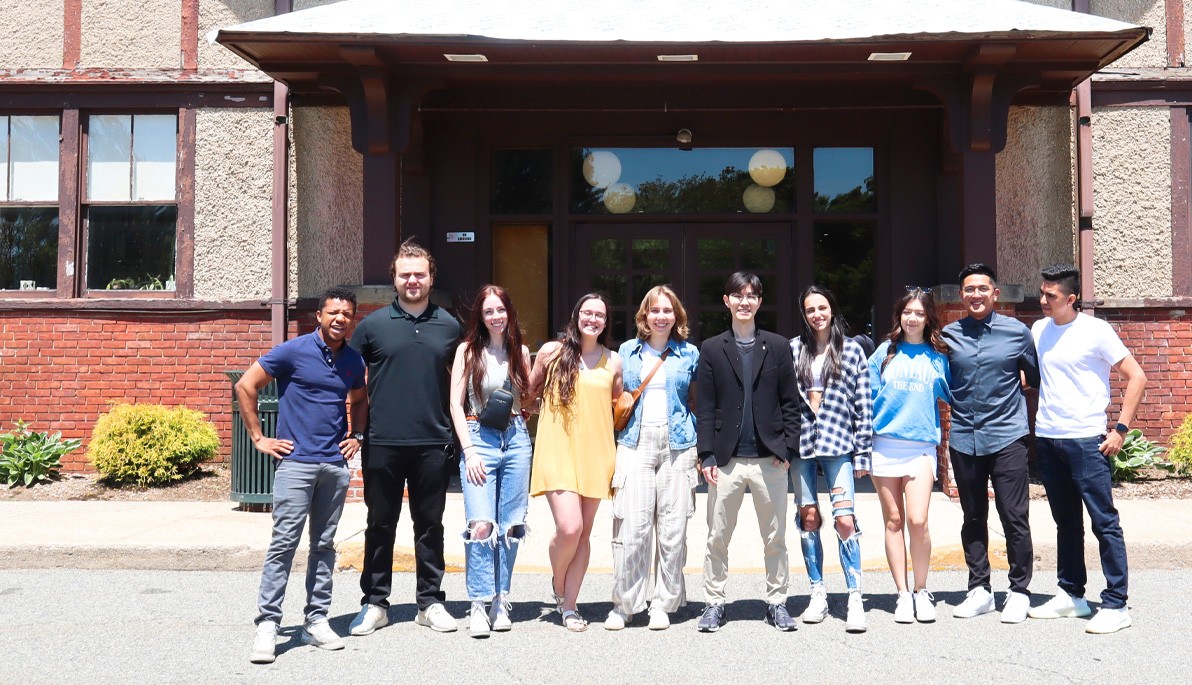Tech
Faculty Profile: Evan Shieh

Pictured: Evan Shieh (sixth from right) runs his own research and design practice, Emergent Studio, concurrently with his professorial duties at New York Tech.
Evan Shieh, MAUD, has practiced architecture and urban design professionally for more than a decade. But, after one conversation with the School of Architecture and Design teaching assistant professor, it is evident that his driving passion is not just for the field but for his students, as well.
In his teaching career, Shieh has taught subjects ranging from advanced research and design studios to introductory core studios at the undergraduate and graduate levels. As each course “demands different and tailored pedagogical approaches to the varying program levels and experiences of the students themselves,” Shieh views teaching as a profession that is “just as much about my own learning as it is about imparting knowledge on my students.”
Since joining New York Tech in 2022, he has taught upper-level advanced architecture studio courses that expose students to how design is involved in not just the production of spatial form but also as a product of and contributor toward larger social and ecological systems. His professional research investigates these very systems, focusing on the urban and environmental effects that mono-functional infrastructures (infrastructure designed with only a single function) and technologies like autonomous vehicles have on the built environment (human-made structures and spaces) of cities. In class, he tasks his students to confront these issues in their course projects.
Shieh challenges his students through nontraditional and innovative design methods. In 2023, he assigned his thesis students to design a fully playable board game that explored the course’s topic: the designer’s role in the potential building, removal, and conversion of highway infrastructures. The game illuminated the multiple actors, stakeholders, methods of operation, and agendas used to achieve desired outcomes. Along with developing an understanding of the roles they may have to play in intervening in those agendas, players learned that design is not just spatial and outcome-based but also critically process-based.
In 2023, Evan Shieh assigned his thesis students to design a fully playable board game that explored the course’s main topic: aspects of the potential building, removal, and conversion of highway infrastructures.
Through interactive learning, Shieh also challenges his students to expand the scope of how architecture is defined, enabling them to move past the traditional boundaries of design education. His efforts have not gone unnoticed. He recently received New York Tech’s Presidential Excellence in Teaching Award and the National Association of Collegiate Schools of Architecture/American Institute of Architecture Students New Faculty Teaching Award, both of which recognize him for dedication and innovation in his teaching practices as demonstrated by student success and learning.
Outside of academia, the architect and urbanist runs his own practice, Emergent Studio. Positioned as both a design and a research studio, Emergent works at architecture’s intersection with urbanism, landscape, and infrastructure. The studio’s founding in 2021 marked 10 years since Shieh graduated with his Bachelor of Architecture from the University of Southern California and several years since earning his Master of Architecture in Urban Design from the Harvard University Graduate School of Design.
“It was the perfect opportunity to begin testing the urban and spatial practices that I wanted to explore and define for myself in the built environment—something I had been itching to do after having worked for some time in both private and public sector offices,” Shieh says.
2023 was a busy year for the studio: it advanced a project study to adaptively transform the Ridgewood Reservoir in Brooklyn from a decommissioned infrastructure to a publicly accessible space, curated an exhibition that was displayed in September at the 2023 Seoul Biennale of Architecture and Urbanism exploring the adaptive conversion of the city’s bridge network, and participated in several international competitions for the construction of a variety of cultural institutions in South Korea.
Shieh is also in the final stages of authoring a nearly 500-page book—a design-research monograph that lays the blueprint for incorporating driverless vehicles into cities and the spatial effects they will have on urban futures. Titled Autonomous Urbanism: Towards a New Transitopia, part of the book deploys the unique format of an architectural graphic novel. The publication has a projected fall 2024 release date.
“Think about design as a form of research and weave a narrative story through it,” advises Shieh, who, by following his own advice, has found unyielding joy in the field and the classroom. “Being both an academic and a practitioner is truly a dream vocation for me.”









